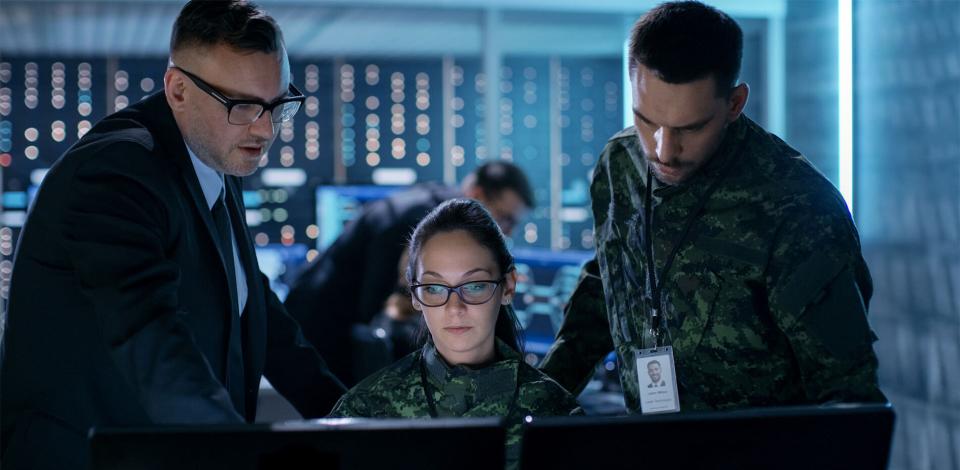Diplomacy, Defense, and the Nuances of Modern International Security
From climate change to rising anti-democratic nationalism, international security professionals leverage diplomacy and defense strategies to sustain resilience in our interconnected world.

Today’s interconnected global dynamics bring distinct security concerns to the forefront. These concerns encompass everything from environmental matters to disruptive technologies, nuclear proliferation, and many other contemporary concerns. Diplomacy and defense function as crucial avenues for negotiation and conflict resolution, amplified by innovative strategies for tackling complex environmental and geopolitical challenges. Through a nuanced blend of alliance-building and robust military capabilities, international security practitioners work to avoid conflicts as well as advance global and domestic interests.
What Is International Security?
International security is the strategic and tactical safeguarding of people and data resources that calls for cross-border contributions from corporations, nonprofits, and, of course, government agencies. It represents a distinct blend of statecraft, cybersecurity, and geopolitics.
While security has traditionally been defined within the context of military and diplomatic concerns, its reach has expanded significantly in recent years. This expansion comes in response to the increasingly global nature of economic, social, and environmental issues.
To that end, Margaret Kosal, Associate Professor in the Sam Nunn School of International Affairs, highlights the rise of domestic and global anti-democratic nationalism as a major threat to international security. Some recent examples include Russia’s illegal war against the sovereign state of Ukraine, the temporary withdrawal of the United States from the World Health Organization (WHO), and the abrogating of the Iran nuclear deal.
Kosal also highlights climate change as a top threat to international security sharing “In response to anthropogenic climate change, new policies and investments in alternative clean energy sources are being pursued globally, including emerging technologies for nuclear energy and fusion. Climate change is expected to create instability and increase the potential for conflict, which may raise the risks of a nuclear exchange; while at the same time, states may desire nuclear weapons as a deterrent. Other significant impacts of climate change on international security include the growing number of climate refugees and the increasingly severe natural disasters.”
Given the scope of these concerns and their relevance on a global scale, it’s clear that a collaborative, cross-border approach is needed to address the most urgent and potentially devastating issues our world faces today.
The Impact of Diplomacy on International Security
Diplomacy, at its core, calls for deliberate communication between representatives of states with the intent of influencing international activities and events. Safeguarding international relationships through respect, collaboration, negotiation, and creativity aids in upholding global security, delivering change, and maintaining a stable relationship between the parties involved.
As a critical component of foreign relations, diplomacy is vital to understanding the broad landscape of international security. Lawrence Rubin, Associate Professor in the Sam Nunn School of International Affairs, emphasizes that diplomacy “can be a complementary or primary tool of statecraft. Diplomacy can help transmit valuable information and reduce tensions between adversaries. Most importantly, diplomacy occurs between allies as well as adversaries.”
The Role of Defense in Maintaining Global Security
Diplomacy is not the only instrument used to solve and manage challenging relationships. Addressing complex issues requires a sense of curiosity and a broad knowledge of tools and tactics that will generate effective outcomes and inspire cooperation among the involved parties.
Diplomacy, information, military, and economics are essential components that make up the DIME model. According to Robert Bell, distinguished professor of the practice in the Sam Nunn School of International Affairs, "Military actions (e.g., training, exercises, deployments, etc.) underpin our military's basic capabilities. Those capabilities in turn underpin the deterrent value of our military forces, hopefully persuading adversaries not to act in ways contrary to our national and alliance interests and/or values.” He stresses that “The military ‘instrument’ itself should be seen as only one of the four key elements of any integrated national security strategy. The other elements being 'diplomacy' (i.e., foreign policy interactions intended to try to resolve disputes and issues without conflict), 'information' (i.e., public diplomacy), and 'economics' (i.e., sanctions).”
Careers in International Security: A Path Toward Global Stability
International security may be, at its heart, a comprehensive and complicated global matter, but individuals play heavily into modern efforts to promote a stable world. We rely on the professionals working in international security to research geopolitical matters, analyze a wealth of security data, and interact with representatives from across the globe to reach a mutual understanding.
From risk intelligence managers to intelligence analysts and compliance officers, a variety of career paths allow professionals to draw on their nuanced understanding of geopolitics, cybersecurity, and military strategy to help companies and governmental organizations navigate a complex international landscape.
- Global compliance officers – Professionals in this role are responsible for ensuring an organization adheres to relevant laws, regulations, and internal policies across all jurisdictions in which it operates. They design and implement compliance programs, conduct risk assessments, and oversee audits to identify and mitigate potential compliance issues. Additionally, global compliance officers or managers may train employees on compliance matters, develop strategies to manage regulatory changes, and act as a liaison with regulatory bodies. This position is crucial in maintaining the ethical standards and legal integrity of the organization on a global scale.
- Threat intelligence analysts – Threat intelligence analysts specialize in identifying, analyzing, and mitigating cyberthreats that could impact global security. They gather and evaluate data from diverse sources—including open-source intelligence, dark web forums, and proprietary databases—to understand and anticipate the tactics, techniques, and procedures (TTPs) used by cyber adversaries. These analysts protect critical infrastructure, government institutions, and multinational organizations from cyber espionage, terrorism, and other threats.
- Risk intelligence managers – These individuals identify, assess, and manage risks that could affect global security operations, objectives, and information systems. Risk intelligence managers analyze data sources that span the domains of geopolitical developments, economic trends, and security threats to provide a comprehensive view of potential risks.
Career paths centered around international security call for a thorough understanding of the nuances of diplomacy and defense, plus a broad range of skills that are best developed while pursuing a master's degree in international security, a master’s in global security, or another closely relevant program (including international security degrees online).
The Importance of International Security Degrees in Shaping Global Policies and Business
An international security degree (like a master’s in global security) can provide powerful insight into the nuances of both national and global security. As global issues become more complex, it will take the world's brightest minds to tackle these concerns, plus strong skills in cross-cultural negotiations and crisis decision-making. Georgia Tech’s Master of Science in International Security Online familiarizes learners with international security challenges and emerging threats, the influences that drive the formulation and implementation of security policy, and how to apply research skills to address international affairs problems.
National, Global, Human, and Traditional Security: What is Most Crucial?
The last few years have seen a distinct shift from emphasizing national security to pursuing a more global-oriented approach. The concept of integrated deterrence understands that today's most urgent challenges are too complex and too far-reaching for one nation to tackle on its own.
With this approach comes a need for an even greater understanding of geopolitical concerns. Those who play a part in facilitating global security must commit to advancing their national interests while also operating effectively across domains, regions, and throughout the entire spectrum of conflict.
Human Security vs. Traditional Security
The concept of human security reveals how the struggle to survive can irreparably damage the social fabric, leading to increased conflict that even the most sophisticated defense strategy cannot curtail. Advocates believe that moving forward, international security, national security, and even regional security must be closely tied to human security.
Throughout history, human security has been inextricably tied to globalization. Katja Weber, Professor in the Sam Nunn School of International Affairs, points out that “Proponents of globalization associate it with the expansion of democracy and improved access to goods and services. While critics highlight the human costs like rising inequality and political and economic exploitation.” Weber also details how we may be experiencing the aftermath of the peak of globalization, termed deglobalization. “Given the staggering number of serious human rights violations across the globe (exploitation of garment workers in Cambodia or Bangladesh, the use of human slaves in the fisheries off the coast of Indonesia, and the uprooting of farmers from their land to make room for hydroelectric dams or palm-oil plantations), debates about the impact of deglobalization on human security are urgently needed.”
Human security and traditional security are not an either-or proposition. Both areas play into modern efforts to promote international security. Traditional security strategies allow nations to deter conflict and project strength and credibility, while human security ensures that international security professionals take proactive steps to address the underlying concerns that lead to conflict in the first place.
How Does Traditional Security Contribute to International Security?
The traditional security mindset emphasizes national security concerns, with military action at the forefront and concerns like terrorism top of mind. However, due to an ever-growing and broad range of concerns, traditional security now encompasses a greater focus on diplomacy-oriented solutions.
Skills like flexibility and the ability to work with diverse groups of people are necessary for tackling threats to international security. According to Kosal, “Individuals working in traditional and international security might not ever have to deal with an authoritarian potentate trying to acquire nuclear weapons, but they are likely to have to address situations where a new technology will have unexpected consequences.” It is not possible for one person to develop expertise across the full of current and emerging threats facing the world, but strong fundamental knowledge and experience in the space is needed to develop an adequate level of adaptability.
Start Your International Security Journey
As the first step toward building a more stable and peaceful world, passionate and hardworking individuals must obtain the nuanced training necessary to effectively influence security strategies and concerns. This nuanced training is available through Georgia Tech’s Master of Science in International Security Online. To learn more about Georgia Tech's commitment to equipping students with skills for addressing emerging international threats and the online international security degree, click here.

